Lenten Reflections
April 16
Excerpts from Exactly What Is Lent
Originally published in The Priest, March 2008
Father Hart writes that repentance is at the heart of the Lenten season. Repentance implies a change of direction in one’s life, a new attitude or way of thinking or behaving. The preacher’s task is to invite listeners to be open to repentance and be willing to counteract any resistance. Lent can become a new beginning in one’s life. We need to replace unjust anger, resentment, hurts with forgiveness, letting go and not living in the past.
 Author: Richard Hart OFM Cap has been preaching parish renewals and missions for over 25 years, both in the US and abroad.
Author: Richard Hart OFM Cap has been preaching parish renewals and missions for over 25 years, both in the US and abroad.
He has written several books including Powerlessness: Passion for the Possible, Preaching: The Secret to Parish Revival, Preach As Risk Taker, How Christian Are You?, and Edging God Out.
April 11
 As I’ve been thinking about temptation this Lent, one of the things I’ve noticed is that, while personal, temptation is also universal. Each of us goes through temptation in a personal way and sometimes we can get stuck into thinking no one else will understand what we are going through. And while it’s true that others do not experience the temptation we do in the same way we do, that temptation affects or has affected a good many more people than ourselves. We are not, in fact, tempted alone. Others have faced what we are facing as well.
As I’ve been thinking about temptation this Lent, one of the things I’ve noticed is that, while personal, temptation is also universal. Each of us goes through temptation in a personal way and sometimes we can get stuck into thinking no one else will understand what we are going through. And while it’s true that others do not experience the temptation we do in the same way we do, that temptation affects or has affected a good many more people than ourselves. We are not, in fact, tempted alone. Others have faced what we are facing as well.
As I thought about this, I turned to the 5th chapter of the letter of James. The writer says that if one is sick, they should call for the elders of the community and be prayed over. He says that anyone dealing with sin, and therefore temptation, should do the same thing. “Confess your sins to one another,” he says. I think one of the benefits of this is that in doing so, we realize we aren’t facing that temptation alone. I think one of the ways temptation has power over us is by making us think we can’t talk about it… that we are alone. It’s much easier for an enemy to defeat a defender if that defender has no allies. Divide and conquer. There is a story of St. Teresa, (I think it’s Saint Teresa) that the night before she professed her vows, she was strongly tempted to leave because the devil played on her fears for her family. She felt she couldn’t tell any one, but she went to the mistress of novices and told her, and immediately the temptation and fear went away. My prayer for us today is that we realize we are not alone in our temptations and that there are others we can turn to who can help us because they understand as well, and that we take advantage of that great blessing.
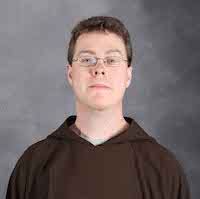 Author: Capuchin Friar David Hirt professed Perpetual Vows last July and is now a Spiritual Director and supervisor, as well as interim Campus Minister, at St. Lawrence Seminary High School in Mt. Calvary, WI. He obtained a Masters of Divinity degree from Catholic Theological Union in Chicago. Before joining the Capuchins, David completed a Masters of Fine Arts in Scenic Design at Wayne State University in Detroit. He is a published poet and an amateur artist.
Author: Capuchin Friar David Hirt professed Perpetual Vows last July and is now a Spiritual Director and supervisor, as well as interim Campus Minister, at St. Lawrence Seminary High School in Mt. Calvary, WI. He obtained a Masters of Divinity degree from Catholic Theological Union in Chicago. Before joining the Capuchins, David completed a Masters of Fine Arts in Scenic Design at Wayne State University in Detroit. He is a published poet and an amateur artist.
April 9
 It's almost here. The light at the end of the Tunnel. This Sunday is Palm Sunday and then we begin our final trek towards Jerusalem, Calvary, the Tomb, and, ultimately, Resurrection. We've as good as made it. We can take it easy on those Lenten Resolutions now, right? Well, no. I think that for me is the big temptation right now. I've worked hard on my resolution all through Lent. It's been hard and good, and right now, I just want to say 'well I can fudge it a bit. I've done so well. God will understand.'
It's almost here. The light at the end of the Tunnel. This Sunday is Palm Sunday and then we begin our final trek towards Jerusalem, Calvary, the Tomb, and, ultimately, Resurrection. We've as good as made it. We can take it easy on those Lenten Resolutions now, right? Well, no. I think that for me is the big temptation right now. I've worked hard on my resolution all through Lent. It's been hard and good, and right now, I just want to say 'well I can fudge it a bit. I've done so well. God will understand.'
Now I'm not going to say what God will or will not understand. But we're looking for spiritual fruit here. It's in these moments of wanting to take it easy that our real character can show, I think. Can we stick to our resolutions? Jesus in Gethsemene after the Last Supper didn't say 'Well Father, It's been a good three year run. I've done everything you've asked to this point. I'm gonna take it easy now.' He wanted to, of course, but in the end he didn't. He prayed through it and held out to where he was being called to go.
Now I don't know what each of us has been struggling with this Lent. Some of us may be struggling with something as big as Jesus did. The promise we have, though, is that if we hold out, we'll be blessed for it, and a little prayer goes a long way to helping us get there. My prayer for each of us today is that we realize we're not alone in our resolutions and also that we receive the strength we need to hold out to the end. That light at the end of the tunnel is going to feel a lot better on our up-turned faces if we do.
 Author: Capuchin Friar David Hirt professed Perpetual Vows last July and is now a Spiritual Director and supervisor, as well as interim Campus Minister, at St. Lawrence Seminary High School in Mt. Calvary, WI. He obtained a Masters of Divinity degree from Catholic Theological Union in Chicago. Before joining the Capuchins, David completed a Masters of Fine Arts in Scenic Design at Wayne State University in Detroit. He is a published poet and an amateur artist.
Author: Capuchin Friar David Hirt professed Perpetual Vows last July and is now a Spiritual Director and supervisor, as well as interim Campus Minister, at St. Lawrence Seminary High School in Mt. Calvary, WI. He obtained a Masters of Divinity degree from Catholic Theological Union in Chicago. Before joining the Capuchins, David completed a Masters of Fine Arts in Scenic Design at Wayne State University in Detroit. He is a published poet and an amateur artist.
April 3
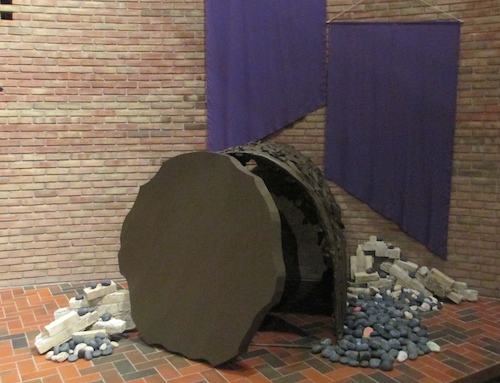
Think about it. There are people who are passionate about justice issues because of the anger they feel at injustice. Their anger can be righteous and good, but that anger can slip out into other parts of their life where it doesn't do good things. As a creative person, I myself am often subject to envy when witnessing other peoples' creations or talents. But that envy, properly channeled, pushes me to create better, truer works of my own. Perhaps you know a leader with great authority and that active, controlling ability takes over in places where vulnerability or egalitarianism should come to the fore. It seems our temptations may be our unsaved, un-ressurected urges.
During our penance services, I had the students write their greatest temptations on a stone with chalk and place it by the tomb at the front of the chapel as a promise of resurrection. My prayer today is that we may all place our un-ressurected temptations in the tomb with Christ and wait and pray for the resurrection he promises us, an trust that it will come.
 Author: Capuchin Friar David Hirt professed Perpetual Vows last July and is now a Spiritual Director and supervisor, as well as interim Campus Minister, at St. Lawrence Seminary High School in Mt. Calvary, WI. He obtained a Masters of Divinity degree from Catholic Theological Union in Chicago. Before joining the Capuchins, David completed a Masters of Fine Arts in Scenic Design at Wayne State University in Detroit. He is a published poet and an amateur artist.
Author: Capuchin Friar David Hirt professed Perpetual Vows last July and is now a Spiritual Director and supervisor, as well as interim Campus Minister, at St. Lawrence Seminary High School in Mt. Calvary, WI. He obtained a Masters of Divinity degree from Catholic Theological Union in Chicago. Before joining the Capuchins, David completed a Masters of Fine Arts in Scenic Design at Wayne State University in Detroit. He is a published poet and an amateur artist.
April 2
Father Hart comments on the action of fasting during Lent.
The purpose of fasting is to change our perceptions and vision or to increase our ability to see what ordinarily seems opaque. Fasting can cast light on the areas of our darkness and free people to pray more intensely, and be more willing to perform good works.
Lent has often been characterized as a desert experience. Desert is a place of deprivation. We don’t like being deprived because we are often slaves to food, pleasure and what others think of us. The desert offers a new found freedom where we leave behind the familiar. Are we afraid of that? Whether we walk in the Garden of Eden or in the desert, we have to remember that God walked there first. We need to face the desert if we are to reach the garden where all are free.
 Author: Richard Hart OFM Cap has been preaching parish renewals and missions for over 25 years, both in the US and abroad.
Author: Richard Hart OFM Cap has been preaching parish renewals and missions for over 25 years, both in the US and abroad.
He has written several books including Powerlessness: Passion for the Possible, Preaching: The Secret to Parish Revival, Preach As Risk Taker, How Christian Are You?, and Edging God Out.
March 31
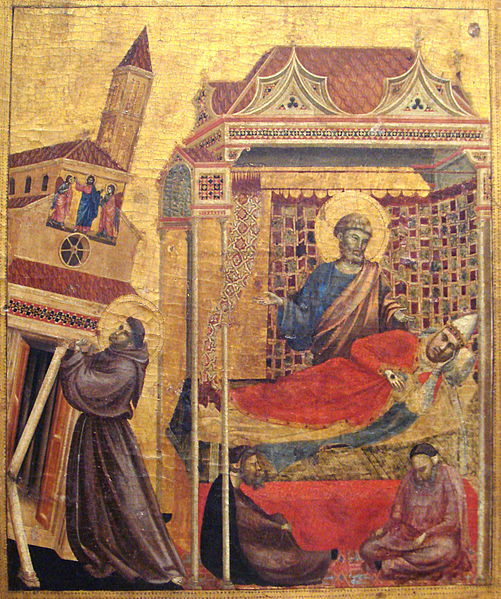 For evening prayer tonight with the boys at St. Lawrence, the reading I'm choosing is Ephesians 4: 25-32. As I was reading this passage and thinking about our subject of resisting temptation, I was struck by how temptation isn't only about breaking down our relationship with God but also our relationships with others. I wonder how easy it is at times to realize we've fallen to the temptation to speak poorly of someone, or let our anger get the better of us, and go to the Sacrament of Reconciliation and ask God for forgiveness and yet not move to fix our broken relationships. Franciscan theology often speaks about being in Union with God AND those whom God loves. If our goal as Christians is to love God and our neighbor as ourselves, than temptation also acts to break apart the second one.
For evening prayer tonight with the boys at St. Lawrence, the reading I'm choosing is Ephesians 4: 25-32. As I was reading this passage and thinking about our subject of resisting temptation, I was struck by how temptation isn't only about breaking down our relationship with God but also our relationships with others. I wonder how easy it is at times to realize we've fallen to the temptation to speak poorly of someone, or let our anger get the better of us, and go to the Sacrament of Reconciliation and ask God for forgiveness and yet not move to fix our broken relationships. Franciscan theology often speaks about being in Union with God AND those whom God loves. If our goal as Christians is to love God and our neighbor as ourselves, than temptation also acts to break apart the second one.
Saint Paul gives us many ways to resist these community-breaking temptations: not letting the sun go down on anger, build people up with our speech instead of tear them down, and speak the truth.
My prayer for us today is that we always remember that the Other, the person we are not, is just as worthy of respect as we are and that this is also and always a consideration in our attempts to resist temptation.
 Author: Capuchin Friar David Hirt professed Perpetual Vows last July and is now a Spiritual Director and supervisor, as well as interim Campus Minister, at St. Lawrence Seminary High School in Mt. Calvary, WI. He obtained a Masters of Divinity degree from Catholic Theological Union in Chicago. Before joining the Capuchins, David completed a Masters of Fine Arts in Scenic Design at Wayne State University in Detroit. He is a published poet and an amateur artist.
Author: Capuchin Friar David Hirt professed Perpetual Vows last July and is now a Spiritual Director and supervisor, as well as interim Campus Minister, at St. Lawrence Seminary High School in Mt. Calvary, WI. He obtained a Masters of Divinity degree from Catholic Theological Union in Chicago. Before joining the Capuchins, David completed a Masters of Fine Arts in Scenic Design at Wayne State University in Detroit. He is a published poet and an amateur artist.
March 26
 Last night at St. Lawrence we did the first two of our Penance services for the individual classes. I asked them the question, "Why does God forgive us?" It's a good question I think. God is under no obligation to forgive us anything. The answer last night came out of Hebrews 2. As Christians we believe that God became human in the person of Jesus. Jesus experienced everything that we experience except for sin. He experienced temptation and human weakness and temptation is what we've been talking about all through Lent. Last night I asked the boys to write their biggest temptation, not sin, on a rock and after they went to confession to place it by the tomb we have constructed for Lent at the front of the chapel. Reconciliation is like Resurrection because it gives us a new start. Placing the rocks by the tomb, I hope, will become a symbol of the promise of our own Resurrection and freedom from sin and temptation. And the important thing is that Jesus is with us through it all.
Last night at St. Lawrence we did the first two of our Penance services for the individual classes. I asked them the question, "Why does God forgive us?" It's a good question I think. God is under no obligation to forgive us anything. The answer last night came out of Hebrews 2. As Christians we believe that God became human in the person of Jesus. Jesus experienced everything that we experience except for sin. He experienced temptation and human weakness and temptation is what we've been talking about all through Lent. Last night I asked the boys to write their biggest temptation, not sin, on a rock and after they went to confession to place it by the tomb we have constructed for Lent at the front of the chapel. Reconciliation is like Resurrection because it gives us a new start. Placing the rocks by the tomb, I hope, will become a symbol of the promise of our own Resurrection and freedom from sin and temptation. And the important thing is that Jesus is with us through it all.
So why does God forgive us? Because God knows. God understands our struggles because they were experienced in the person of Jesus. And just as Jesus did not give in to temptation, we continue to struggle against it as well, and wait for that forgiveness when we fail while trying.
My prayer for us today is that we continue to turn to God for the forgiveness freely offered us as in our journey that God walked before we did and continues to walk with us in Jesus Christ.
 Author: Capuchin Friar David Hirt professed Perpetual Vows last July and is now a Spiritual Director and supervisor, as well as interim Campus Minister, at St. Lawrence Seminary High School in Mt. Calvary, WI. He obtained a Masters of Divinity degree from Catholic Theological Union in Chicago. Before joining the Capuchins, David completed a Masters of Fine Arts in Scenic Design at Wayne State University in Detroit. He is a published poet and an amateur artist.
Author: Capuchin Friar David Hirt professed Perpetual Vows last July and is now a Spiritual Director and supervisor, as well as interim Campus Minister, at St. Lawrence Seminary High School in Mt. Calvary, WI. He obtained a Masters of Divinity degree from Catholic Theological Union in Chicago. Before joining the Capuchins, David completed a Masters of Fine Arts in Scenic Design at Wayne State University in Detroit. He is a published poet and an amateur artist.
March 24

I saw Muppets Most Wanted tonight with my parents. I've always been a Muppets fan and jumped at the chance to see this one. For anyone who's seen the trailers or commercials, you know that the plot is that evil Constantine, a Kermit look-a-like, has orchestrated his escape from prison by framing Kermit and switching places. Kermit has been struggling with the Muppets, trying to get them to see that just because they may want to do something doesn't mean that it is the right thing at the time. The good of the show must come first. When Constantine takes over, he lets the Muppets do whatever they want. While the Muppets occasionally have misgivings about how Kermit may have changed, they accept "Kermit" when they are allowed to have their own way. The show suffers and they can't, or won't, see it. Constantine's constant refrain is "Whatever you want."
I think we all occasionally come up against the same temptation. We often want to see what we want as the good, even as virtuous, and when someone tells us to do it, we're more than willing to look the other way even if we have been told it's not the right thing before. How often are we tempted to put our 'good' above the good of all? How do we resist this temptation?
I think the answer is a tough one because it forces us to, not put others ahead of ourselves, but to put the good of all at the front. The focus is not 'I' or 'Thee' but 'We.' It becomes about the community and that can sometimes be hard in today's world. We resist the temptation by fostering the alternative and opening ourselves to that possibility.
My prayer for us today is that we more and more develop the communal mindset; the communal mindset that allows for the prophetic. My prayer is that we develop a compassion that isn't easy or facile but concerned and strong. Whatever We need.
 Author: Capuchin Friar David Hirt professed Perpetual Vows last July and is now a Spiritual Director and supervisor, as well as interim Campus Minister, at St. Lawrence Seminary High School in Mt. Calvary, WI. He obtained a Masters of Divinity degree from Catholic Theological Union in Chicago. Before joining the Capuchins, David completed a Masters of Fine Arts in Scenic Design at Wayne State University in Detroit. He is a published poet and an amateur artist.
Author: Capuchin Friar David Hirt professed Perpetual Vows last July and is now a Spiritual Director and supervisor, as well as interim Campus Minister, at St. Lawrence Seminary High School in Mt. Calvary, WI. He obtained a Masters of Divinity degree from Catholic Theological Union in Chicago. Before joining the Capuchins, David completed a Masters of Fine Arts in Scenic Design at Wayne State University in Detroit. He is a published poet and an amateur artist.
March 20
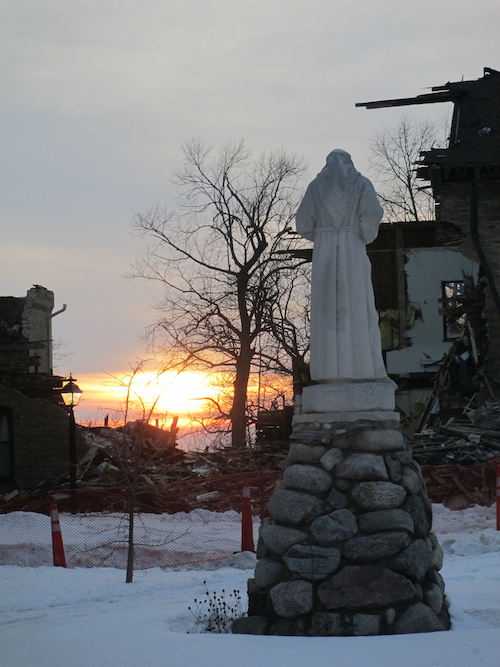 This last week and a half has been a tough one. The Fire at St. Lawrence destroyed so much with memories attached to it for so many people. One of my father's cousins died this week as well. There is the temptation, at times, to give in to despair. This past weekend I also went to see a play in Minneapolis called The Last Days of Judas Iscariot. The play, too, is about despair. Every character in the play is struggling with it in some way or another. It's an insidious temptation because it tries to get us to see God as incapable or at least unwilling to love us and then convinces us that we are unworthy of it if God doesn't seem to be giving us the mercy we crave.
This last week and a half has been a tough one. The Fire at St. Lawrence destroyed so much with memories attached to it for so many people. One of my father's cousins died this week as well. There is the temptation, at times, to give in to despair. This past weekend I also went to see a play in Minneapolis called The Last Days of Judas Iscariot. The play, too, is about despair. Every character in the play is struggling with it in some way or another. It's an insidious temptation because it tries to get us to see God as incapable or at least unwilling to love us and then convinces us that we are unworthy of it if God doesn't seem to be giving us the mercy we crave.
At the funeral today for my Dad's cousin, the Gospel was the resurrection of Lazarus. The characters in the Gospel don't necessarily doubt Jesus… they just don't know what he is capable of. It's the Gospel where Jesus weeps in his own mourning and with the other mourners. At the end of the play, Judas refuses to give up his despair and Jesus keeps washing his feet, trying to get him to see. God does the same with us in this season of Lent.
My prayer today is that we all allow ourselves to be open to the mercy we crave and continue moving toward the hope of resurrection Easter promises.
 Author: Capuchin Friar David Hirt professed Perpetual Vows last July and is now a Spiritual Director and supervisor, as well as interim Campus Minister, at St. Lawrence Seminary High School in Mt. Calvary, WI. He obtained a Masters of Divinity degree from Catholic Theological Union in Chicago. Before joining the Capuchins, David completed a Masters of Fine Arts in Scenic Design at Wayne State University in Detroit. He is a published poet and an amateur artist.
Author: Capuchin Friar David Hirt professed Perpetual Vows last July and is now a Spiritual Director and supervisor, as well as interim Campus Minister, at St. Lawrence Seminary High School in Mt. Calvary, WI. He obtained a Masters of Divinity degree from Catholic Theological Union in Chicago. Before joining the Capuchins, David completed a Masters of Fine Arts in Scenic Design at Wayne State University in Detroit. He is a published poet and an amateur artist.
March 19
Excerpts from Exactly What Is Lent
Originally published in The Priest, March 2008
How do we find a delicate balance between the rigorous fasting and self-denial of the past and meaningful ways to observe Lent?
Father Hart explains it is a time of self-denial and self-examination. Fasting is a well-established biblical custom. True fasting involves a struggle. Father Hart reminds us that fasting has to be done always in relationship to prayer and almsgiving…not just a donation of money, but good works such as a gift of our time or talent. And Jesus challenges us to all of this without being seen. Jesus expects His disciples to be already doing these acts. He says, “Your Father, who sees in secret, will reward you.” (MT 6:4) Father Hart wonders if that is how we should approach Lent. It is a secret shared only with God.
 Author: Richard Hart OFM Cap has been preaching parish renewals and missions for over 25 years, both in the US and abroad.
Author: Richard Hart OFM Cap has been preaching parish renewals and missions for over 25 years, both in the US and abroad.
He has written several books including Powerlessness: Passion for the Possible, Preaching: The Secret to Parish Revival, Preach As Risk Taker, How Christian Are You?, and Edging God Out.
March 13, 2014
.jpg) The third part of Jesus' temptation in the desert has the devil trying to get Jesus to throw himself from the top of the Temple because surely God will save him. In Luke, this is the final temptation and in some ways is the culmination of the episode. Jesus has been resisting temptation the whole way through by saying God will provide and that God is the all powerful one who will make things happen. So the devil says, 'You're right. Prove it to yourself.' This is perhaps the most subtle of temptations and the one that many truly faithful people can fall into. We tell ourselves that God will help us keep our resolutions. If we fail than maybe God wanted us to fail for some reason. It's a subtle temptation that keeps us from acting in a fully human way and turns us instead into automatons. We have free will. Spiritual growth must be worked for as well as received as gift. It is a balancing act between the two. If we don't give ourselves opportunities to grow, how can God bring us to the growth? A seed unplanted will never be a tree no matter how good a seed it is.
The third part of Jesus' temptation in the desert has the devil trying to get Jesus to throw himself from the top of the Temple because surely God will save him. In Luke, this is the final temptation and in some ways is the culmination of the episode. Jesus has been resisting temptation the whole way through by saying God will provide and that God is the all powerful one who will make things happen. So the devil says, 'You're right. Prove it to yourself.' This is perhaps the most subtle of temptations and the one that many truly faithful people can fall into. We tell ourselves that God will help us keep our resolutions. If we fail than maybe God wanted us to fail for some reason. It's a subtle temptation that keeps us from acting in a fully human way and turns us instead into automatons. We have free will. Spiritual growth must be worked for as well as received as gift. It is a balancing act between the two. If we don't give ourselves opportunities to grow, how can God bring us to the growth? A seed unplanted will never be a tree no matter how good a seed it is.
My prayer for us today is that we work on our resolutions and resist the temptation to give up our free will in the matter by testing God.
 Author: Capuchin Friar David Hirt professed Perpetual Vows last July and is now a Spiritual Director and supervisor, as well as interim Campus Minister, at St. Lawrence Seminary High School in Mt. Calvary, WI. He obtained a Masters of Divinity degree from Catholic Theological Union in Chicago. Before joining the Capuchins, David completed a Masters of Fine Arts in Scenic Design at Wayne State University in Detroit. He is a published poet and an amateur artist.
Author: Capuchin Friar David Hirt professed Perpetual Vows last July and is now a Spiritual Director and supervisor, as well as interim Campus Minister, at St. Lawrence Seminary High School in Mt. Calvary, WI. He obtained a Masters of Divinity degree from Catholic Theological Union in Chicago. Before joining the Capuchins, David completed a Masters of Fine Arts in Scenic Design at Wayne State University in Detroit. He is a published poet and an amateur artist.
March 12, 2014
LENTEN CHALLENGE
Pope Francis has offered us a Lenten challenge. The challenge is to confront the poverty of our brothers and sisters in a concrete way by taking practical steps to alleviate it. He believes there are three kinds of destitution: material, moral and spiritual. Material consists in people living in conditions which are not human. They lack the basic needs like water, food, hygiene, and work. These afford them the opportunity to grow and develop as human beings. We need to act as a diakonia which is a call to serve the poor and oppressed. As wounded healers we help to heal their wounds.
We have an obligation to end all violations to human dignity, discrimination and abuse which are rampant in the world. Power, luxury, and craving for money, can become our idols, rather than working for a fair distribution of wealth. Conversion to justice, equality, simplicity and sharing must assume a priority in our lives.
Moral destitution is evident in slavery to vice and sin. Much pain is often experienced in families because one member - often a young person- is addicted to alcohol, drugs, gambling or pornography. Many people find life meaningless and have no hope for the future. Social conditions like unemployment take away the dignity of a breadwinner of a family. What contributes to powerlessness and even suicide is the inability to receive an education or health care.
Spiritual destitution is closely linked to our turning away from God and rejecting God’s love. Some believe that they do not need God, but can manage on their own, which leads to destruction. Pope Francis believes that God alone can save and free us, and that the Gospel is the antidote to spiritual destitution. Each of us is called to proclaim the freeing news that forgiveness of our sins is possible. God is greater than our sinfulness. God continues to love us and we are made for communion with God and eternal life.
Pope Francis challenges us to be joyful heralds of God’s mercy and hope! It can be a thrilling experience to share the good news with others, to console broken hearts, and offer hope to our brothers and sisters who are suffering and in darkness. Jesus is our guide who sought after the poor and sinners. He did this as a shepherd seeks after his lost sheep. We are encouraged to follow his example.
 Author: Richard Hart OFM Cap has been preaching parish renewals and missions for over 25 years, both in the US and abroad.
Author: Richard Hart OFM Cap has been preaching parish renewals and missions for over 25 years, both in the US and abroad.
He has written several books including Powerlessness: Passion for the Possible, Preaching: The Secret to Parish Revival, Preach As Risk Taker, How Christian Are You?, and Edging God Out.
March 11, 2014
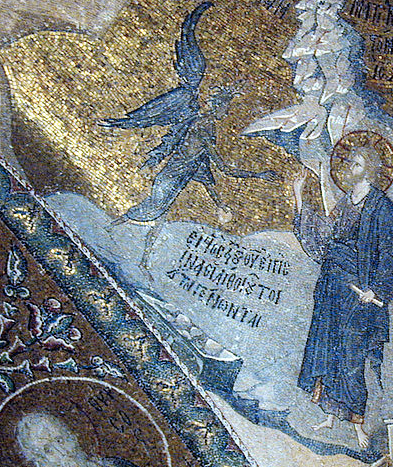
Tonight with the boys I'm continuing with Luke's telling of the Temptation in the Desert. Jesus, in his second temptation, is tempted with power. Now there's nothing inherently wrong with power. Power can be used for good and many of us have power in our daily life. But Jesus is tempted with power for it's own sake… power to use for himself. This is when the temptation to power becomes a problem. When it becomes power OVER rather than power FOR people.
In the Gospel I think the Devil unwittingly gives Jesus the answer to the temptation. In asking Jesus to worship him, the Devil reminds Jesus to whom worship really belongs… to God. Jesus responds in humility, acknowledging that God has the power and that his own role is to serve that greater good.
Perhaps this gives us a key to resisting temptation as well. The temptation may be masked as a good for ourselves or others but we should try to step back and ask ourselves is it good for God.
I pray today that those of us with power use it as servants for the good of others, and that those of us who desire power seek it for the right reasons.
 Author: Capuchin Friar David Hirt professed Perpetual Vows last July and is now a Spiritual Director and supervisor, as well as interim Campus Minister, at St. Lawrence Seminary High School in Mt. Calvary, WI. He obtained a Masters of Divinity degree from Catholic Theological Union in Chicago. Before joining the Capuchins, David completed a Masters of Fine Arts in Scenic Design at Wayne State University in Detroit. He is a published poet and an amateur artist.
Author: Capuchin Friar David Hirt professed Perpetual Vows last July and is now a Spiritual Director and supervisor, as well as interim Campus Minister, at St. Lawrence Seminary High School in Mt. Calvary, WI. He obtained a Masters of Divinity degree from Catholic Theological Union in Chicago. Before joining the Capuchins, David completed a Masters of Fine Arts in Scenic Design at Wayne State University in Detroit. He is a published poet and an amateur artist.
March 7, 2014
 In preparing Evening Prayer for tonight, I chose Luke's Temptation in the Desert. We are told in his account that the devil tempted Jesus throughout the 40 days. I think this opens up the first temptation, turn stone to bread, in new ways for me. It seems to me that this becomes not a temptation to use power for yourself, but to turn away from spiritual practice meant to bring you closer to God… to take the easy way out and abandon the Divinely Inspired call to penance and perfection. This may be the basic temptation for many people all through Lent. Jesus defends himself from the temptation by reminding himself that food, or relaxation, or free-time, or what have you, while in themselves good, are not the only things we need to be healthy human beings. I pray we all stay strong in the Spirit in our chosen spiritual exercise this Lent and that it brings us to Easter as new and renewed people.
In preparing Evening Prayer for tonight, I chose Luke's Temptation in the Desert. We are told in his account that the devil tempted Jesus throughout the 40 days. I think this opens up the first temptation, turn stone to bread, in new ways for me. It seems to me that this becomes not a temptation to use power for yourself, but to turn away from spiritual practice meant to bring you closer to God… to take the easy way out and abandon the Divinely Inspired call to penance and perfection. This may be the basic temptation for many people all through Lent. Jesus defends himself from the temptation by reminding himself that food, or relaxation, or free-time, or what have you, while in themselves good, are not the only things we need to be healthy human beings. I pray we all stay strong in the Spirit in our chosen spiritual exercise this Lent and that it brings us to Easter as new and renewed people.
 Author: Capuchin Friar David Hirt professed Perpetual Vows last July and is now a Spiritual Director and supervisor, as well as interim Campus Minister, at St. Lawrence Seminary High School in Mt. Calvary, WI. He obtained a Masters of Divinity degree from Catholic Theological Union in Chicago. Before joining the Capuchins, David completed a Masters of Fine Arts in Scenic Design at Wayne State University in Detroit. He is a published poet and an amateur artist.
Author: Capuchin Friar David Hirt professed Perpetual Vows last July and is now a Spiritual Director and supervisor, as well as interim Campus Minister, at St. Lawrence Seminary High School in Mt. Calvary, WI. He obtained a Masters of Divinity degree from Catholic Theological Union in Chicago. Before joining the Capuchins, David completed a Masters of Fine Arts in Scenic Design at Wayne State University in Detroit. He is a published poet and an amateur artist.
March 5, 2014
LENT A TIME FOR PRAYER
Lent for many is a time of spring cleaning. Cleaning the house and especially the windows is paramount. Getting the crud off the windows allows the sunshine to come through in brilliant arrays after winter shadows. Cleaning closets is always challenging because we find out how much we have accumulated. Ash Wednesday marks that soul-searching time reminding us to change our lives where it is needed. We are invited out into the desert where Jesus went to face our enemies: pride, resentment, jealousy, unjust anger, and lack of forgiveness.
The prophet Joel sets the pace by reminding us that it is easier to rend our garments than to our hearts. We need to go deeper and embrace the inner work, especially to accept suffering in our lives. Pain and suffering are experiences that all of us bear at some time in our lives. It is even more challenging when a loved one suffers and we are powerless to help the individual. Pain suffering can be embraced on a wider scale where war and violence cause untold damage to peoples’ lives, especially in Syria, Sudan, Ukraine, and many other troubled spots.
We might not be able to do much to alleviate these situations, but we can pray which is the core of Lent. It takes an incredible amount of courage and discipline to pray daily rather than giving up candy or smoking. By being faithful to prayer, we gradually learn that nothing else can satisfy our human hearts than being in union with God. The price tag might be high, but the results far outweigh the effort.
Jesus tells us to go inside a room and close the door. We need to close the door to all our distractions, the phone calls, the e-mails that need to be answered, the shopping, the project we are working on. We need silence for God to speak to us. Thomas Keating, a contemplative guru, calls silence the language of God. So all else is a very poor translation. Silence helps us draw closer to a loving God.
If we are faithful to our prayer during these forty days, a change will take place in us. We rid ourselves of selfishness, we become kinder, we are less judgmental, we become more trusting. We will pay more attention to others who are need, the poor, the hungry, the lonely. We often don’t see them or want to see them. Prayer will help us clean the windows of our souls so we will not only see them, but reach out to them.
 Author: Richard Hart OFM Cap has been preaching parish renewals and missions for over 25 years, both in the US and abroad.
Author: Richard Hart OFM Cap has been preaching parish renewals and missions for over 25 years, both in the US and abroad.
He has written several books including Powerlessness: Passion for the Possible, Preaching: The Secret to Parish Revival, Preach As Risk Taker, How Christian Are You?, and Edging God Out.
February 28, 2014
Lenten Reflection Series
Hi Everybody,
Check out the video introduction to my Lenten Reflection Series.
Peace and Good- Br. David
See Bro David’s posts on the Midwest Capuchin Franciscan Vocation Office Facebook page.
February 25, 2014
Pre-Lent Reflection
A Historical Perspective
The idea of a forty day period of preparation for Easter began to take hold in the fourth century, because of the forty days Jesus spent in the desert. It was to be a time or period of prayer and fasting. But in the beginning, Lent and fasting were not synonymous as they are today. Lent began with the first Sunday of Lent and was known as quadragesima or a forty day period.
But we might ask, how did they figure out this period of time since there were only six weeks in Lent, because six times seven equals forty-two? Lent ended with Holy Thursday and the Easter celebration began on Good Friday. Easter for the early Christians was not so much the celebration of Christ’s death and resurrection, but the celebration of his redemption which is the real meaning Christ’s death and resurrection. They were taken together.
In the sixth and seventh century fasting became more and more the theme of the Lenten observance. The closing of the Lenten season was changed to midnight of Holy Saturday. From earliest times, no one fasted on Sundays because Sunday was dominated by the resurrection theme. Hence, Sundays could not be included as fast days, so you have thirty-six days of actual fasting.
Some were satisfied with thirty-six days, but others wanted forty days after the example of Christ. Thus the only solution was to push the Lenten season back to the Wednesday before the first Sunday in Lent, known as Ash Wednesday, which made forty days. Originally the ashes were distributed to only the people who were to do public penance during Lent. But, in time, they were given to all as a sign of humility and penance.
In early times everyone was suppose to do penance for one’s sins, but even public penance was carried out by those who needed it. Those who were doing penance were given their own special place in church–a place separate from the rest of the congregation. A later custom was driving the penitents from the church by the bishop, just as God had done to Adam and Eve, the original sinners, from paradise.
Lent is also a special time preparing people for baptism. In the early Church all candidates for baptism were exercised several times before receiving the sacrament. Some of the Gospels used during Lent deal with Jesus’ healing miracles.
There use to be a medieval custom of hanging a veil in front of the sanctuary, thus cutting it off from view of the congregation. One pastor who thought that his church had too many statues was able to remove one each year. The reasoning behind this custom may have been that during this time of penance the faithful should deprive themselves even of the sight of the holy place in the church. Another explanation is that the veiling is an allusion to the words, “Jesus hid himself and went out of the temple.” In medieval times this veil was hung at the very beginning of Lent. As the architecture of churches changed it was found necessary to veil the statues individually. The time of the veiling was then probably changed to Passion Sunday to accentuate this time as one of even greater penance as Easter drew near.

Author: Richard Hart OFM Cap has been preaching parish renewals and missions for over 25 years, both in the US and abroad.
He has written several books including Powerlessness: Passion for the Possible, Preaching: The Secret to Parish Revival, Preach As Risk Taker, How Christian Are You?, and Edging God Out.



